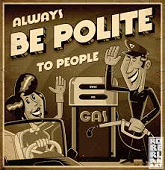
Imagine you are in a heavy traffic situation and cars are trying to merge into your lane. The cars in front of you are staunchly holding their positions. You slow to allow a vehicle to merge and the driver lifts a hand to thank you. How do you feel now? Do you appreciate that the other driver acknowledged your letting them in - even if all you did was obey traffic laws? Would you be upset if the other driver did not thank you? We face similar types of situations daily in our work and home lives and use of a little courtesy (or the lack of them) can have big and lasting effects.
We face many forms of constant communications in our work lives. I remember learning in school that there must always be a pleasantry in the beginning and close of all letters. I am sure that dates me to many readers and is a formality that is all but gone.
With electronic communications, if you are out of the office for a week and come back to hundreds of emails in your inbox, do you read each one thoroughly or skim for important information? Because important details might be missed, more people are opting to write efficiently without pleasantries. Unfortunately, efficiency can make an office colder and more conducive to workplace arguments.
The Department of Psychology of the University of Winnipeg, Canada determined that people who text 200 or more times a day show a decrease in reflective thought. The confluence of our use of electronics and the immediacy of feedback along with the needs for brevity and efficiency has led to a significant reduction in courtesy. The contrast of giving all the relevant information and doing so in a concise manner to be as efficient with the reader's time often leads to a lack of formal courtesy. More people are fired for deficiencies in interpersonal communications than for incompetence.
Courtesy is a sign of respect and takes very little time. Saying hello, please and thank you are quick, easy ear candy! Even if someone disagrees with a view, if they like the person and feel respected, the person is more likely to work towards resolution rather than arguments. Think about how you appreciate when someone shows you a simple courtesy and how that can ripple to making many people happier. Being the catalyst in your workplace can make you, your colleagues and your supervisors happier, healthier and more productive!
You can start small with just making an extra effort to say hello, please, thank you and you're welcome. If accompanied with a smile and is sincere, these can be a formidable force of courtesy. After showing simple respect you might progress to maybe start some short conversations with your colleagues about their lives, their goals and their interests. These are easy steps that can go a long way in helping others feel better which will help employees be more content, live longer and healthier lives, gain company loyalty and become more productive.
For more on being a courtesy catalyst in your workplace, contact Mako & Associates at DeeAn@MakoEd.com or 206-992-7484.
